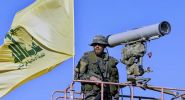
A glimmer of hope can finally be seen in the Middle East and is emanating, surprisingly, from Lebanon, where the state is restoring its sovereignty and shrinking the Hezbollah tumor. More needs to be done. For now, however, the country is on the right track. “It has only been six or seven months,” a senior U.S. official told The Wall Street Journal, “and we have stepped to a place that I am not sure I thought was achievable back in November.”
But all is not done yet, and Lebanon’s journey to peace and normalcy can be derailed at any minute, for many reasons. The malicious Islamist Iranian regime is weakened, but not dead. It is lying low and biding its time, certain that America does not have enough patience to see the Middle East cross the finish line and move to a post-Islamist Iran future.
American officials are aware that change has a window that will eventually close. Lebanese officials know that, too, but are not moving at full speed, for two reasons.
First, America’s talks with Iran are putting every anti-Iran government in the region on the edge. Should a deal be cracked and Tehran receive tens of billions of dollars, Iran’s newfound wealth could revive its proxy militias, first and foremost Lebanon’s Hezbollah.
If Hezbollah gets a second lease on life, Lebanese officials do not want to be caught on the wrong side of things.
Second, Beirut must grapple with another problem. The Lebanese military is patriotic and competent, but is thinly stretched, policing the borders with Syria, the seaports, and the airport, and performing domestic security duties. Salaries in the Lebanese Army are relatively low, prompting many of its troops to take second jobs to make ends meet.
Lebanon has been asking for material support for its military. Beirut is not asking for supersonic jets or advanced artillery. It only wants enough fuel to operate the army’s vehicles, potable water, and other logistic needs for its battalions, and enough cash to keep the force from want.
Hezbollah knows that the Lebanese Army is capable and has thus been threatening civil war should the military make a move to disarm the militia. The same excuse Hezbollah used to warn against the ejection of the military of Syrian President Bashar Assad from Lebanon in 2005. That year, Assad withdrew, and the country never plunged into civil war.
In the case of the Lebanese military versus Hezbollah, several troops, especially the Shia, might have mixed feelings when taking on the pro-Iran militia. But it is likely that these troops, even if they desert, will not affect the capabilities of the army. Furthermore, it is very likely that in the event of escalation between the Lebanese Army and Hezbollah, the majority of the Lebanese population will side with and support their national army, making Hezbollah’s position increasingly untenable.
Hezbollah is certainly planning a comeback. It has been trying to smuggle money and gold into the country to fund its hefty rehabilitation bill.
But the militia are not certain how to proceed. Should it lie down and pretend to be dead until the storm passes? Or should it threaten the Lebanese preemptively, like how Hezbollah chief Naim Qassem warned that the militia would treat any party that tries to disarm it like Hezbollah treats Israel? By putting the Lebanese state on par with Israel, Hezbollah finally showed its true face: its arms are not really to defend Lebanon against Israel but to dominate the Lebanese state by provoking Israel and scaring the Lebanese of imaginary Israeli schemes against their northern neighbors.
Lebanon is enjoying a streak of luck. Israel tipped the military balance against Hezbollah. A new style of U.S. diplomacy that says it like it is has also prompted the Lebanese state to sober up and pursue real goals, instead of rehashing the same old tired talking points.
But luck is not enough, and Lebanon is not out of the woods yet. A lot of hard work remains to be done.
Once Hezbollah’s military command is dismantled, its arms surrendered, the Lebanese Shia must stand up to the pro-Iran militia and face them in the 2026 election. For these elections, Hezbollah has been allocating resources that dwarf any of its opponents. The militia should not be allowed to maintain its monopoly over the 27-seat Shia bloc in Parliament.
Lebanon is on the right track, finally, but not irreversibly. If the Middle East teaches us anything, it is that nothing is done until it is done. The Lebanese would be well advised to stay focused until they help their country across the finish line.




Comments